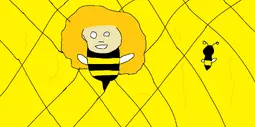
R: 25 / I: 5
Maya will have a small army of incels orbiting her and paying her and giving her attention. But she will happily be used by chads knowing that they will never love her. When found out by her orbiters, she will cry and say stuff like she was lonely.
Unlike Mymy and Coco who will be pure until they get married to save the white. Knowing degeneracy is a kike concept
Maya will have a small army of incels orbiting her and paying her and giving her attention. But she will happily be used by chads knowing that they will never love her. When found out by her orbiters, she will cry and say stuff like she was lonely.
Unlike Mymy and Coco who will be pure until they get married to save the white. Knowing degeneracy is a kike concept

R: 109 / I: 31
You WILL learn dutch
You WILL NOT use jewlingo or any other shitty time wasting "language learning" application
You WILL input wih dutch content
You WILL NOT get demoralized by monolingual amerilards
and you have to do all those things because…. because you just have to, ok??
Some resources:
https://4chanint.miraheze.org/wiki/Dutch
https://fsi-languages.yojik.eu/languages/DLI/DLI-Dutch.html
dutch learning thread
This is a thread meant to encourage people to take on dutch and start learning it. Share resources or information that you consider valuable, or something.You WILL learn dutch
You WILL NOT use jewlingo or any other shitty time wasting "language learning" application
You WILL input wih dutch content
You WILL NOT get demoralized by monolingual amerilards
and you have to do all those things because…. because you just have to, ok??
Some resources:
https://4chanint.miraheze.org/wiki/Dutch
https://fsi-languages.yojik.eu/languages/DLI/DLI-Dutch.html

R: 70 / I: 12
Nu 'blox "game"
wasted like a lot of time doing this hope YOU will at least not hate it. i don't know if you can even count this as a "game" but it sure is an impressive project that i myself am quite proud of.
I also added in 1 secret and i hope someone manages to figure it out, perhaps look through the badges of the game and figure out, another hint i can give you is there is a feature on 'tube if you type "awesome" it makes the bar flicker, that's my hint to getting whatever the secret is and i really hope that one of you figures it out. but enough of me larping play the "game" NOAW
https://www.roblox.com/games/71320148290903/
(also zoot please don't rape me i spent a lot of time doing it for all of you!)
Nu 'blox "game"
wasted like a lot of time doing this hope YOU will at least not hate it. i don't know if you can even count this as a "game" but it sure is an impressive project that i myself am quite proud of.
I also added in 1 secret and i hope someone manages to figure it out, perhaps look through the badges of the game and figure out, another hint i can give you is there is a feature on 'tube if you type "awesome" it makes the bar flicker, that's my hint to getting whatever the secret is and i really hope that one of you figures it out. but enough of me larping play the "game" NOAW
https://www.roblox.com/games/71320148290903/
(also zoot please don't rape me i spent a lot of time doing it for all of you!)

R: 24 / I: 2
German: ungesellig
Soyspeak: 'zellig
English: asocial; unsociable
Wait; this is not right. How come the English variant is so different from its xister languages?
Despite English belonging to the West Germanic language family, alongside Dutch, German, and Soyspeak, the translated words are significantly different. This divergence is because the words did not derive from pure (Aryan) Germanic roots but rather from what is known today as Middle French.
Historically, English was entirely Germanic until the Norman Conquest of England in 1066. Afterward, the Norman French became the ruling class of England, causing English to mix with Middle French. This is why modern English contains many Latinate words and deformed spellings.
However, there has been propaganda to revert English back to its Aryan roots. In 1966, a chud named Paul Jennings published a series of articles titled "1066 and All Saxon." These articles unfolded a version of English that might have existed had the Norman Invasion failed. This led to decades of events that would make Jennings's propaganda successful. The resulting type of English is known today as " *Anglish*. " Examples of Anglish include "rainshade" for umbrella and "godlore" for religion. Imo these words are arguably better than xeir English counterparts.
This raises the question: what would the word "ongezellig" be in pure Aryan English, aka Anglish? Let's find out!
The word "ongezellig" consists of four parts:
- "on," meaning "not";
- "ge," which has a complicated definition that is hard to understand;
- "zell," the root word, which isn't a word in Dutch and derives directly from the Proto-Germanic "saljô," meaning "roommate" or "companion";
- "ig," which forms adjectives from nouns.
All these parts, except one, can be easily translated into English (I'll explain later please be patient)
"on-" can be translated to "un-," as both mean "not" and come from the same root.
"ge-" can be translated to "a-," which seems unrelated but actually makes sense if you research it on Wiktionary. An example is "gelijk" versus "alike."
Since "zell" isn't a Dutch word, translating it is a bit more challenging. However, we can consult Wiktionary for its derivative "saljô" and its descendants. Unfortunately, English has no direct word originating from "saljô," but we can create one by following English's phonological shift. I think "sell" would be OK.
Finally, "-ig" can be translated to "-y," as both form adjectives from nouns and share the same root.
Thus, the result would be "unaselly," which aligns more closely with English's xister languages.
If you've read this far, I thank you, as it took me more than an hour of dedication to write what I believe is a potential gem.
Soyolinguistics
Dutch: ongezelligGerman: ungesellig
Soyspeak: 'zellig
English: asocial; unsociable
Wait; this is not right. How come the English variant is so different from its xister languages?
Despite English belonging to the West Germanic language family, alongside Dutch, German, and Soyspeak, the translated words are significantly different. This divergence is because the words did not derive from pure (Aryan) Germanic roots but rather from what is known today as Middle French.
Historically, English was entirely Germanic until the Norman Conquest of England in 1066. Afterward, the Norman French became the ruling class of England, causing English to mix with Middle French. This is why modern English contains many Latinate words and deformed spellings.
However, there has been propaganda to revert English back to its Aryan roots. In 1966, a chud named Paul Jennings published a series of articles titled "1066 and All Saxon." These articles unfolded a version of English that might have existed had the Norman Invasion failed. This led to decades of events that would make Jennings's propaganda successful. The resulting type of English is known today as " *Anglish*. " Examples of Anglish include "rainshade" for umbrella and "godlore" for religion. Imo these words are arguably better than xeir English counterparts.
This raises the question: what would the word "ongezellig" be in pure Aryan English, aka Anglish? Let's find out!
The word "ongezellig" consists of four parts:
- "on," meaning "not";
- "ge," which has a complicated definition that is hard to understand;
- "zell," the root word, which isn't a word in Dutch and derives directly from the Proto-Germanic "saljô," meaning "roommate" or "companion";
- "ig," which forms adjectives from nouns.
All these parts, except one, can be easily translated into English (I'll explain later please be patient)
"on-" can be translated to "un-," as both mean "not" and come from the same root.
"ge-" can be translated to "a-," which seems unrelated but actually makes sense if you research it on Wiktionary. An example is "gelijk" versus "alike."
Since "zell" isn't a Dutch word, translating it is a bit more challenging. However, we can consult Wiktionary for its derivative "saljô" and its descendants. Unfortunately, English has no direct word originating from "saljô," but we can create one by following English's phonological shift. I think "sell" would be OK.
Finally, "-ig" can be translated to "-y," as both form adjectives from nouns and share the same root.
Thus, the result would be "unaselly," which aligns more closely with English's xister languages.
If you've read this far, I thank you, as it took me more than an hour of dedication to write what I believe is a potential gem.

R: 29 / I: 6
Also, I've been planning to live in the Netherlands in 10-20 years from now on, any tips or anything I should know? Comment if you also think of living there!
Mother's Day
Hello my brothers! What are you doing in this beautiful sunday night? I've just finished making a special dinner for Mother's Day, she seemed so happy. Have you made something unique for your mother today? :3Also, I've been planning to live in the Netherlands in 10-20 years from now on, any tips or anything I should know? Comment if you also think of living there!

R: 11 / I: 3
The changes to the text are not much, since i can't speak german that much. There could also be differences in the singing and the text for melodic purposes.
Text:
Künstler und Sänger
schaffens nie allein
können nie allein die Sieger
auf dem Katalog sein.
(Kameraden) laßt uns singen
eine Melodie
denn es soll ein Lied erklingen
auf die Stoßstangen
Denn sie ist allerzeit
immer kampfbereit
ob es Frösche, Tiere (oder) Pferde.
Ihrem steten Kampfgelingen
ist dieses Lied erdacht.
Künstler und Sänger
schaffens nie allein
können nie allein die Sieger
auf dem Katalog sein.
Können es nicht schaffen
ohne deinen Einsatz nie!
Königin der /qa/
Zellig Stoßstangen!
Ohne Halt durch Sturm und Regen
mitten in der Nacht.
Ohne Halt dem Feind entgegen
was auch kommen mag.
Ob auch heiß der Tag
ob auch kalt die Nacht
ob auch fern die Zarty ist.
Stets kämpft auf allen Wegen
stolz der zelligmann.
Künstler und Sänger
schaffens nie allein
können nie allein die Sieger
auf dem Katalog sein.
Können es nicht schaffen
ohne deinen Einsatz nie!
Königin der /qa/
Zellig Stoßstangen!
A rough Translation:
Artists and singers
can never make it alone
can never be the winners
on the catalog.
(Comrads) let us sing
a melody
cause there shall sound a song
on the bumper.
Cause she is at all times
always battle ready
whether it (be) Frogs, Animals or Hourses
(From) your steady fightings
this song is made.
Artists and singers
can never make it alone
can never be the winners
on the catalog.
Can never make it
without your commitment, (never)!
Queen of the /qa/
Zellig bumpers!
Without stop through storm and rain
in the middle of the night.
without stop against the enemy
what may comes.
If even a hot day
if even a cold night
if even the Zarty is far away.
Steady fights on all ways
proud the zellig man.
Artists and singers
can never make it alone
can never be the winners
on the catalog.
Can never make it
without your commitment, (never)!
Queen of the /qa/
Zellig bumpers!
Königin der /qa/ (Parody of Königin der Waffen)
I did a parody of Königin der Waffen, dedicated to all necrobumpers! The melody/beat was taken from Bundeswave.The changes to the text are not much, since i can't speak german that much. There could also be differences in the singing and the text for melodic purposes.
Text:
Künstler und Sänger
schaffens nie allein
können nie allein die Sieger
auf dem Katalog sein.
(Kameraden) laßt uns singen
eine Melodie
denn es soll ein Lied erklingen
auf die Stoßstangen
Denn sie ist allerzeit
immer kampfbereit
ob es Frösche, Tiere (oder) Pferde.
Ihrem steten Kampfgelingen
ist dieses Lied erdacht.
Künstler und Sänger
schaffens nie allein
können nie allein die Sieger
auf dem Katalog sein.
Können es nicht schaffen
ohne deinen Einsatz nie!
Königin der /qa/
Zellig Stoßstangen!
Ohne Halt durch Sturm und Regen
mitten in der Nacht.
Ohne Halt dem Feind entgegen
was auch kommen mag.
Ob auch heiß der Tag
ob auch kalt die Nacht
ob auch fern die Zarty ist.
Stets kämpft auf allen Wegen
stolz der zelligmann.
Künstler und Sänger
schaffens nie allein
können nie allein die Sieger
auf dem Katalog sein.
Können es nicht schaffen
ohne deinen Einsatz nie!
Königin der /qa/
Zellig Stoßstangen!
A rough Translation:
Artists and singers
can never make it alone
can never be the winners
on the catalog.
(Comrads) let us sing
a melody
cause there shall sound a song
on the bumper.
Cause she is at all times
always battle ready
whether it (be) Frogs, Animals or Hourses
(From) your steady fightings
this song is made.
Artists and singers
can never make it alone
can never be the winners
on the catalog.
Can never make it
without your commitment, (never)!
Queen of the /qa/
Zellig bumpers!
Without stop through storm and rain
in the middle of the night.
without stop against the enemy
what may comes.
If even a hot day
if even a cold night
if even the Zarty is far away.
Steady fights on all ways
proud the zellig man.
Artists and singers
can never make it alone
can never be the winners
on the catalog.
Can never make it
without your commitment, (never)!
Queen of the /qa/
Zellig bumpers!

R: 24 / I: 6
You VVILL raid the Foenkie booru
So you can submit tag/alias requests without an account and the text will appear on the list, and has to be approved or rejected by an administrator, but there is no administrator. hop on da vpn and 'ape xer site now
<
https://ongezellig.booru.org/index.php?page=alias&s=list
You VVILL raid the Foenkie booru
So you can submit tag/alias requests without an account and the text will appear on the list, and has to be approved or rejected by an administrator, but there is no administrator. hop on da vpn and 'ape xer site now
<
https://ongezellig.booru.org/index.php?page=alias&s=list

R: 19 / I: 2
not just deel thrembo. i mean ALL DEELS. this site has basically infinite info written as text, theoretically if we search there for long enough we'll find all the deels scripts. there's also a version with images so we can also TECHNICALLY search for the frames of the deels, i mean it will only take us like… more before the heat death of the universe, but considering how massa fucked us over i don't see a better option. at least let's try to estimate how long it'd hypothetically take us.
i'm terrible at explaining but it basically has ANY random combination of characters in 400 something i think pages per book, you can theoretically if you want to and search for long enough find ANYTHING, that means anything that was written, is being written, will be ever written and stuff that never was written before. literally ANYTHING. now i'm not sure how we'd find what we want considering there could be basically thousands of different scripts for the same deels, like how could we make sure we got the right one the "canon" one, but that's an issue for our future selves, first we have to find one at all.
there is also a version of it but with images as mentioned before. but again it has ANY image, that means it not just theoretically but holds literally all frames of current deels, and even deels that "could" have been made. we don't have to wait and beg massa, we just have to find it all. once we find it all we'll just have to voice and add sounds and we get as many deels as we want. you want 2 more deels? 5? 10? you can have 1000s of deels doesn't matter, time is the only constraint. except we most likely wouldn't be able to find even ONE frame from even existing deels or any deel that wasn't made for that matter.
the library: https://libraryofbabel.info/
the image version: https://babelia.libraryofbabel.info/
what are we thinking?
==ITT we search for new deels==
ITT we try to find the scripts for all the deelsnot just deel thrembo. i mean ALL DEELS. this site has basically infinite info written as text, theoretically if we search there for long enough we'll find all the deels scripts. there's also a version with images so we can also TECHNICALLY search for the frames of the deels, i mean it will only take us like… more before the heat death of the universe, but considering how massa fucked us over i don't see a better option. at least let's try to estimate how long it'd hypothetically take us.
i'm terrible at explaining but it basically has ANY random combination of characters in 400 something i think pages per book, you can theoretically if you want to and search for long enough find ANYTHING, that means anything that was written, is being written, will be ever written and stuff that never was written before. literally ANYTHING. now i'm not sure how we'd find what we want considering there could be basically thousands of different scripts for the same deels, like how could we make sure we got the right one the "canon" one, but that's an issue for our future selves, first we have to find one at all.
there is also a version of it but with images as mentioned before. but again it has ANY image, that means it not just theoretically but holds literally all frames of current deels, and even deels that "could" have been made. we don't have to wait and beg massa, we just have to find it all. once we find it all we'll just have to voice and add sounds and we get as many deels as we want. you want 2 more deels? 5? 10? you can have 1000s of deels doesn't matter, time is the only constraint. except we most likely wouldn't be able to find even ONE frame from even existing deels or any deel that wasn't made for that matter.
the library: https://libraryofbabel.info/
the image version: https://babelia.libraryofbabel.info/
what are we thinking?

R: 23 / I: 9
>>82060
Trallallero Trallallà, porco dio e porco allah. Ero con il mio fottuto figlio Merdardo a giocare a Fortnite, quando a un punto arriva mia nonna, Ornella Leccacappella
>>82060
Trallallero Trallallà, porco dio e porco allah. Ero con il mio fottuto figlio Merdardo a giocare a Fortnite, quando a un punto arriva mia nonna, Ornella Leccacappella

R: 7 / I: 1
REC
<Hey Zaryans Mymy here. It has been a year since that kike loving race traitor stole my Aryan prince Richard from me and she is getting what she asked for.
(Mymy puts a sick smile with dreamy eyes)
<Yes, only me with a pure white Aryan soul deserves a man like that. And together we will save our race.
(Coco knocks on the door)
>Mymy who are you talking too? We are leaving soon.
<Yes Coco I'm coming.
(Mymy grinds her teeth and glares at the door. The video ends here)
REC
<Hey Zaryans Mymy here. It has been a year since that kike loving race traitor stole my Aryan prince Richard from me and she is getting what she asked for.
(Mymy puts a sick smile with dreamy eyes)
<Yes, only me with a pure white Aryan soul deserves a man like that. And together we will save our race.
(Coco knocks on the door)
>Mymy who are you talking too? We are leaving soon.
<Yes Coco I'm coming.
(Mymy grinds her teeth and glares at the door. The video ends here)

R: 13 / I: 5
Zaryans, it's actually insane how fucking over it is doe. I recently formatted my PC and today I was looking at my steam library to select which games to install on my fresh system. Then I noticed the "last played" info on the corner and it hit me like a truck. games I remember playing like yesterday, Arma 3, bioshock, beamNG, witcher 3, euro truck, in my mind I thought it had been like maybe a couple years since i played them, but the "last played" sections showed me years 2018-2019… six, seven years gone with the blink of an eye, i was shocked to see how long it has really been. sharty didn't even exist back then and at that time I was an angsty 4cucker that had just graduated highschool and it seemed like university would take forever. this made me realise how new the sharty is, it didnt even exist when i used to play these games. yet, i see people here talking about sharty as if it's the ancient times even though sharty still feels like a brand new imageboard in my perspective. all these years gone and i don't have much more than a diploma to my name. more than a decade spent on imageboards, nearly 15 years since i laid eyes on my first 4cuck thread. all this time getting brainwashed on 4cuck,8cuck and kohl/int/ has added nothing beneficial to my life, only niche knowledge and weird fetishes and porn addiction. most of you zaryans here are offsiter normals who come from discord,xitter,youtube etc so i don't think you can understand the gravity of it, but you should quit imageboards as soon as possible or question how much it affects your behavior and psyche. spending time in these places adds up over time and changes you subconsciously even if you believe it's all a joke. zarty is my final stop, my last imageboard after i quit many other imageboards and ended up here. i believe the zarty is a special place, please cherish it while we're here. you won't notice how quickly everything here will become history. another advice i have is if you see something you like on the internet, and you wish to see it again in the future, save it, or else there is no guarantee you will ever see it again, you can't trust stuff on the internet to last forever.
Zaryans, it's actually insane how fucking over it is doe. I recently formatted my PC and today I was looking at my steam library to select which games to install on my fresh system. Then I noticed the "last played" info on the corner and it hit me like a truck. games I remember playing like yesterday, Arma 3, bioshock, beamNG, witcher 3, euro truck, in my mind I thought it had been like maybe a couple years since i played them, but the "last played" sections showed me years 2018-2019… six, seven years gone with the blink of an eye, i was shocked to see how long it has really been. sharty didn't even exist back then and at that time I was an angsty 4cucker that had just graduated highschool and it seemed like university would take forever. this made me realise how new the sharty is, it didnt even exist when i used to play these games. yet, i see people here talking about sharty as if it's the ancient times even though sharty still feels like a brand new imageboard in my perspective. all these years gone and i don't have much more than a diploma to my name. more than a decade spent on imageboards, nearly 15 years since i laid eyes on my first 4cuck thread. all this time getting brainwashed on 4cuck,8cuck and kohl/int/ has added nothing beneficial to my life, only niche knowledge and weird fetishes and porn addiction. most of you zaryans here are offsiter normals who come from discord,xitter,youtube etc so i don't think you can understand the gravity of it, but you should quit imageboards as soon as possible or question how much it affects your behavior and psyche. spending time in these places adds up over time and changes you subconsciously even if you believe it's all a joke. zarty is my final stop, my last imageboard after i quit many other imageboards and ended up here. i believe the zarty is a special place, please cherish it while we're here. you won't notice how quickly everything here will become history. another advice i have is if you see something you like on the internet, and you wish to see it again in the future, save it, or else there is no guarantee you will ever see it again, you can't trust stuff on the internet to last forever.

R: 14 / I: 5
>This is a moment to savor, we just achieved total Zaryan victory. It was certainly a great victory for Zaryans but also for my white wife Coco and our 1488 white children. No conditions it was a total victory. Our chances for victory were slim but we did it.
(Spencer after hearing that Bob will ban race bait)
>This is a moment to savor, we just achieved total Zaryan victory. It was certainly a great victory for Zaryans but also for my white wife Coco and our 1488 white children. No conditions it was a total victory. Our chances for victory were slim but we did it.
(Spencer after hearing that Bob will ban race bait)

R: 34 / I: 9
https://cocoswing.com/
https://cocoswing.com/

R: 3 / I: 1
Schlogcraft is finally open and welcomes the entire soysphere (Except the jassy) to join!
144.217.248.141:25579
https://files.catbox.moe/zcpv7d.mrpack
Use an mrpack compatible launcher (fjord, prism, modrinth, multimc, poly, polly, o algo) and just add the mrpack, it'll the instance set up automatically.
I hope you all enjoy yourselves and I can't wait to see you there!
Schlogcraft is finally open and welcomes the entire soysphere (Except the jassy) to join!
144.217.248.141:25579
https://files.catbox.moe/zcpv7d.mrpack
Use an mrpack compatible launcher (fjord, prism, modrinth, multimc, poly, polly, o algo) and just add the mrpack, it'll the instance set up automatically.
I hope you all enjoy yourselves and I can't wait to see you there!

R: 6 / I: 1
Depressed and purple and old is she!
Purplehair Saggytits!
If netherlandic nonsense is something you wish!
Purplehair Saggytits!
Then pull out your dick and cum on your tish!
Purplehair Saggytits! (Ben je klaar?)
Purplehair Saggytits
Purplehair Saggytits
Purplehair Saggytits
Purplehair… Saggytits!!!
Purplehair Saggytits
Who lives inside a school inside the hague?Depressed and purple and old is she!
Purplehair Saggytits!
If netherlandic nonsense is something you wish!
Purplehair Saggytits!
Then pull out your dick and cum on your tish!
Purplehair Saggytits! (Ben je klaar?)
Purplehair Saggytits
Purplehair Saggytits
Purplehair Saggytits
Purplehair… Saggytits!!!

R: 28 / I: 8
Zaryans we must raid this new ESLpedoFNFjartycuckgooner splinter zelligparty.soy, it's created by some faggot that calls himself Koos and they claim to be "zarty but without the rulecucking" and they keep posting porn of the zelligs, they even have a /goon/ board which is full of brimstone and straight up 'p
https://zelligparty.soy/index.html
https://zelligparty.soy/zellig
https://zelligparty.soy/goon
REPORT THEIR SITE TO CLOUDFLARE FOR HOSTING 'P SO IT WILL SHUT DOWN
KILL THESE PEDONIGGERS NOOOOOOOOOOOOOOOOOOOOOOOOOOOOOOOOOOOOOOOOOOOOOOOOOOOOOOOOOOW!!!
RAID THIS PEDO NIGGERHELL
LETS RAID THE FUCK OUT OF THIS NIGGERHELL PEDO SPLINTER NOOOOOOOW!!!Zaryans we must raid this new ESLpedoFNFjartycuckgooner splinter zelligparty.soy, it's created by some faggot that calls himself Koos and they claim to be "zarty but without the rulecucking" and they keep posting porn of the zelligs, they even have a /goon/ board which is full of brimstone and straight up 'p
https://zelligparty.soy/index.html
https://zelligparty.soy/zellig
https://zelligparty.soy/goon
REPORT THEIR SITE TO CLOUDFLARE FOR HOSTING 'P SO IT WILL SHUT DOWN
KILL THESE PEDONIGGERS NOOOOOOOOOOOOOOOOOOOOOOOOOOOOOOOOOOOOOOOOOOOOOOOOOOOOOOOOOOW!!!

R: 12 / I: 1
Link: https://kiwifarms.net/threads/ongezellig-thread.170300/post-18151758
Below are the most important thing he said about the show
>The illustration he made on petje.af are mostly not canon (think of it as either ideas for the show or a "what if" scenario)
>the Mymy's NEET pic is from an alternate universe (i guess he was talking about Mymy getting caught by her parent watching dutch stuff, idk)
>he says he won’t continue Ongezellig as a comic because he thinks he’s very bad at making comics (he really think that lowly about himself? No wonder people think he sabotaged the show). He also thinks Maya’s Sweet 16 is the worst thing he’s ever made.
>About Maya’s Sweet 16 comic. He said that when printing physical copies of said comics, that it uses cheap printing paper that was meant for small ads and not comics, he hates the comic so much he' unironically refund the people who paid for the comic
>Massa reveals revealed Maya is 1/4th Indonesian, 1/4th Indian, 1/4th Chinese and 1/4th Dutch. (Shes a gigamutt)
>he reveals that Maya dad is 1/2 Surinamese Indian and ½ Dutch.
>He also says that her mom is ½ Moluccan (Indonesian) and ½ Chinese-Indonesian
>Massa then says that the idea behind making Maya a gigamutt is he wants to make a character that has zero identity, who doesnt belong in anywhere. She can’t belong anywhere since they’re alienated by others.
>Massa explain the “farm attack” incident that zellig fans thought was the cause of Coco’s parent's death was a red herring. They died in a fatal car crash. He then goes on to explain that if her parents died by black thieves in a farm attack incident, Coco would've never been close friends with Cleo, since Cleo is an Afro-Aruban.
>Maya's mother' name is “Soei”(It’s a chinese name and Massa apparently had a full Chinese name for her before she married the dad).
>Massa says that Maya's resentment towards her sister, especially towards Coco, starts with her losing her cat
>Massa had an episode idea involving Maya getting a new cat. Coco comes in, she’s allergic so the cat has to go. The cat would go to her grandparents instead, Maya still having access but far less, until one day the cat gets cancer and had to be euthanized. Maya resents Coco even more for taking away her only friend. This was apparently based on a true story from Massa’s life
>Massa reveals that Coco feels immensly guilty for basically losing Maya's cat. She thinks that Maya must feel the same way she herself felt when she lost her biological parents. It's one of the main reason why she's so friendly towards Maya.
>he also planned a a band episode where Maya wanted to Join Coco’s band because she really wants to, but she has no musical talent. Coco’s band is pretty talented and “eurobeat-folkband” centric, which makes no sense but they do it because it’s unique and different. Cleo is the lead singer and guitarist, as well as the main boss of the band. Coco is chill and likes to be there. Yfke is always stoned. Zoey is the quiet introverted type, Maya was actually intersted in befriending Zoey since they’re both quiet types, but besides that they have nothing in common which is why she fails at trying to befriend her since Zoey is uninterested.
>apparently, Mymy’s sister episode is the most fleshed out. Mymy’s sister tracks her down and has this big elaborate scheme where she infiltrates the school pretending to be a korean boy that causes Maya to fall for her since K-Pop boys are hot or something. She immediately befriends Maya (she knows everything about the Schoppenboer family because she’s a genius), she knows Maya’s weak spots. Maya thinks she’s made a friend but Mymy’s sister is just there to get Mymy back to Japan. She asks Maya to stay over for the night, Maya agrees, when she stays over Mymy is none-the-wiser, Coco is VERY skeptical of her presense on befriending Maya, Maya’s mom is just excited to hear Maya finally made a new friend. Coco objects, but Maya’s mom shuts her down and that he can stay (it’s revealed Maya’s mom is the pushy, bitchy type that only likes her kids if they accomplish something). Coco and Mymy keep a lookout on the “boy” that involves a nerfgun shootout between Mymy and her sister like those old cowboy movies. But in the end Mymy’s sister gets found out when they are back at school, Maya chats with her, she goes to the bathroom, Mymy doesn’t buy that her sister is korean so as a test she asks her to sign an autograph of Kim Jon Un since she’s a “big fan”, Mymy’s sister does it in perfect korean handwriting since she studied very hard for it. Later when they’re all back at home Mymy’s sister sneaks into Mymy’s room to kidnap her, pulls the sheets off only to reveal no one’s there, camera cuts to behind her back with Mymy pointing her nerf gun at her. Mymy knew she was a fake since if her sister is “south korean” then she wouldn’t have signed the picture of North Korea’s leader. Mymy’s sister knows this, but she asks how Mymy knows she was her sister. Mymy responds by saying she doesn’t know, this was supposed to be very anticlimactic. Episode maybe ends with Coco beating the shit out of Mymy’s sister and kicks her out, ends sadly as Maya loses what she thought was her only friend. Massa was thinking of hiring an actual Japanese VA to voice Mymy’s sister.
>Massa had a “Anne Frank: The Musical” episode idea that involved Mymy somehow.
>It’s revealed Mymy ran away from her family because she likes the Netherlands more than Japan, changed her identity to not be caught (this was the main reason for becoming orange and freckled, not just that she wants to pass as a Dutch girl as she didn’t want to be caught by her sister). Massa himself admits it’s a bit unrealistic for Mymy to escape Japan as a 6 year old into the Netherlands, but he guesses she’s a genius herself to get rid of the evidence.
>Massa confirms 100% without a shadow of a doubt Maya does not have Autism and only ADD. This is partially based on himself as he has ADD too
>Coco cares a lot about her friends and family, reveals that she did in fact had a unborn sibling from her old family.
New canon Ongezellig lore just dropped
Shortly after Massa announced he would no longer actively find a studio to make his ongezellig show, he did a q/a stream on, i think his discord, where he reveals alot of the lore and the things planned in ongezellig. Thanks to this dude in kiwifarms for "leaking" itLink: https://kiwifarms.net/threads/ongezellig-thread.170300/post-18151758
Below are the most important thing he said about the show
>The illustration he made on petje.af are mostly not canon (think of it as either ideas for the show or a "what if" scenario)
>the Mymy's NEET pic is from an alternate universe (i guess he was talking about Mymy getting caught by her parent watching dutch stuff, idk)
>he says he won’t continue Ongezellig as a comic because he thinks he’s very bad at making comics (he really think that lowly about himself? No wonder people think he sabotaged the show). He also thinks Maya’s Sweet 16 is the worst thing he’s ever made.
>About Maya’s Sweet 16 comic. He said that when printing physical copies of said comics, that it uses cheap printing paper that was meant for small ads and not comics, he hates the comic so much he' unironically refund the people who paid for the comic
>Massa reveals revealed Maya is 1/4th Indonesian, 1/4th Indian, 1/4th Chinese and 1/4th Dutch. (Shes a gigamutt)
>he reveals that Maya dad is 1/2 Surinamese Indian and ½ Dutch.
>He also says that her mom is ½ Moluccan (Indonesian) and ½ Chinese-Indonesian
>Massa then says that the idea behind making Maya a gigamutt is he wants to make a character that has zero identity, who doesnt belong in anywhere. She can’t belong anywhere since they’re alienated by others.
>Massa explain the “farm attack” incident that zellig fans thought was the cause of Coco’s parent's death was a red herring. They died in a fatal car crash. He then goes on to explain that if her parents died by black thieves in a farm attack incident, Coco would've never been close friends with Cleo, since Cleo is an Afro-Aruban.
>Maya's mother' name is “Soei”(It’s a chinese name and Massa apparently had a full Chinese name for her before she married the dad).
>Massa says that Maya's resentment towards her sister, especially towards Coco, starts with her losing her cat
>Massa had an episode idea involving Maya getting a new cat. Coco comes in, she’s allergic so the cat has to go. The cat would go to her grandparents instead, Maya still having access but far less, until one day the cat gets cancer and had to be euthanized. Maya resents Coco even more for taking away her only friend. This was apparently based on a true story from Massa’s life
>Massa reveals that Coco feels immensly guilty for basically losing Maya's cat. She thinks that Maya must feel the same way she herself felt when she lost her biological parents. It's one of the main reason why she's so friendly towards Maya.
>he also planned a a band episode where Maya wanted to Join Coco’s band because she really wants to, but she has no musical talent. Coco’s band is pretty talented and “eurobeat-folkband” centric, which makes no sense but they do it because it’s unique and different. Cleo is the lead singer and guitarist, as well as the main boss of the band. Coco is chill and likes to be there. Yfke is always stoned. Zoey is the quiet introverted type, Maya was actually intersted in befriending Zoey since they’re both quiet types, but besides that they have nothing in common which is why she fails at trying to befriend her since Zoey is uninterested.
>apparently, Mymy’s sister episode is the most fleshed out. Mymy’s sister tracks her down and has this big elaborate scheme where she infiltrates the school pretending to be a korean boy that causes Maya to fall for her since K-Pop boys are hot or something. She immediately befriends Maya (she knows everything about the Schoppenboer family because she’s a genius), she knows Maya’s weak spots. Maya thinks she’s made a friend but Mymy’s sister is just there to get Mymy back to Japan. She asks Maya to stay over for the night, Maya agrees, when she stays over Mymy is none-the-wiser, Coco is VERY skeptical of her presense on befriending Maya, Maya’s mom is just excited to hear Maya finally made a new friend. Coco objects, but Maya’s mom shuts her down and that he can stay (it’s revealed Maya’s mom is the pushy, bitchy type that only likes her kids if they accomplish something). Coco and Mymy keep a lookout on the “boy” that involves a nerfgun shootout between Mymy and her sister like those old cowboy movies. But in the end Mymy’s sister gets found out when they are back at school, Maya chats with her, she goes to the bathroom, Mymy doesn’t buy that her sister is korean so as a test she asks her to sign an autograph of Kim Jon Un since she’s a “big fan”, Mymy’s sister does it in perfect korean handwriting since she studied very hard for it. Later when they’re all back at home Mymy’s sister sneaks into Mymy’s room to kidnap her, pulls the sheets off only to reveal no one’s there, camera cuts to behind her back with Mymy pointing her nerf gun at her. Mymy knew she was a fake since if her sister is “south korean” then she wouldn’t have signed the picture of North Korea’s leader. Mymy’s sister knows this, but she asks how Mymy knows she was her sister. Mymy responds by saying she doesn’t know, this was supposed to be very anticlimactic. Episode maybe ends with Coco beating the shit out of Mymy’s sister and kicks her out, ends sadly as Maya loses what she thought was her only friend. Massa was thinking of hiring an actual Japanese VA to voice Mymy’s sister.
>Massa had a “Anne Frank: The Musical” episode idea that involved Mymy somehow.
>It’s revealed Mymy ran away from her family because she likes the Netherlands more than Japan, changed her identity to not be caught (this was the main reason for becoming orange and freckled, not just that she wants to pass as a Dutch girl as she didn’t want to be caught by her sister). Massa himself admits it’s a bit unrealistic for Mymy to escape Japan as a 6 year old into the Netherlands, but he guesses she’s a genius herself to get rid of the evidence.
>Massa confirms 100% without a shadow of a doubt Maya does not have Autism and only ADD. This is partially based on himself as he has ADD too
>Coco cares a lot about her friends and family, reveals that she did in fact had a unborn sibling from her old family.

R: 22 / I: 6
>Moralbrigadiers insist that the show's minor characters should not be lewded in any capacity
>Said moralbrigadiers also stash porn of their favorite characters from the show in some hole somewhere
>They also do a bad job of hiding such by being too comically opposed to any sort of lewding that one may suspect of them being too puritanical for no other reason besides guilty conscience
Many such cases! Especially with tourists who discovered the show like a couple weeks ago. My time in Xitter has at least taught me this.
>Moralbrigadiers insist that the show's minor characters should not be lewded in any capacity
>Said moralbrigadiers also stash porn of their favorite characters from the show in some hole somewhere
>They also do a bad job of hiding such by being too comically opposed to any sort of lewding that one may suspect of them being too puritanical for no other reason besides guilty conscience
Many such cases! Especially with tourists who discovered the show like a couple weeks ago. My time in Xitter has at least taught me this.

R: 4 / I: 1
<Hello goys. I am Rabbi Zoot. I am broad casting <this from our 'cord synagogue in Jewyork. The <Jannie Kabbalah is with me. Our plan of <twisting Ongezellig from it's original 1488 <white power pan European message to it's <current Nigger race mixing goon slop state on <this site is completed. Now keep being good <goys and posting race bait OK goyim? hehehe (Rubs hand kikely)
(I have added music to listen to while you read this) (Jannies don't 'nish me please I love Israel and diversity)
We will allow this up to show our grace and mercy.
<Hello goys. I am Rabbi Zoot. I am broad casting <this from our 'cord synagogue in Jewyork. The <Jannie Kabbalah is with me. Our plan of <twisting Ongezellig from it's original 1488 <white power pan European message to it's <current Nigger race mixing goon slop state on <this site is completed. Now keep being good <goys and posting race bait OK goyim? hehehe (Rubs hand kikely)
(I have added music to listen to while you read this) (Jannies don't 'nish me please I love Israel and diversity)
We will allow this up to show our grace and mercy.

R: 3 / I: 1
Kill humans. Behead humans. Roundhouse kick a human into the concrete. Slam dunk a human baby into the trashcan. Crucify filthy humans. Defecate in a humans food. Launch humans into the sun. Stir fry humans in a wok. Toss humans into active volcanoes. Urinate into a human's gas tank. Judo throw humans into a wood chipper. Twist humans heads off. Report humans to the irs. Karate chop humans in half. Curb stomp pregnant humans. Trap humans in quicksand. Crush humans in the trash compactor. Liquify humans in a vat of acid. Eat humans. Dissect humans. Exterminate humans in the gas chamber. Stomp humans skulls with steel toed boots. Cremate humans in the oven. Lobotomize humans. Mandatory abortions for humans. Grind human fetuses in the garbage disposal. Drown humans in fried chicken grease. Vaporize humans with a ray gun. Kick old humans down the stairs. Feed humans to alligators. Slice humans with a katana.
Kill humans. Behead humans. Roundhouse kick a human into the concrete. Slam dunk a human baby into the trashcan. Crucify filthy humans. Defecate in a humans food. Launch humans into the sun. Stir fry humans in a wok. Toss humans into active volcanoes. Urinate into a human's gas tank. Judo throw humans into a wood chipper. Twist humans heads off. Report humans to the irs. Karate chop humans in half. Curb stomp pregnant humans. Trap humans in quicksand. Crush humans in the trash compactor. Liquify humans in a vat of acid. Eat humans. Dissect humans. Exterminate humans in the gas chamber. Stomp humans skulls with steel toed boots. Cremate humans in the oven. Lobotomize humans. Mandatory abortions for humans. Grind human fetuses in the garbage disposal. Drown humans in fried chicken grease. Vaporize humans with a ray gun. Kick old humans down the stairs. Feed humans to alligators. Slice humans with a katana.

R: 78 / I: 27
I Shall Walk comic thread
A thread dedicated to yet another ongoing xitter 'mic. Titled "I Shall Walk", here's the link to author's xitter - https://x.com/topjapsterdam?t=QN51BnWGT4vRumhoUOHQEQ&s=09













































































